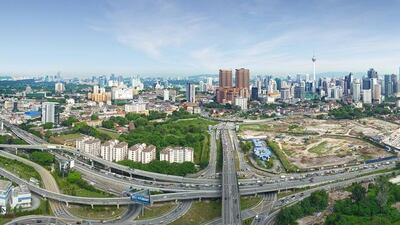From the dizzying heights of the Petronas Towers observation deck, in the heart of bustling Kuala Lumpur, you can easily make out the site.
Adjoining the existing central business district, right beside the main airport road, is a 70-acre plot of levelled land with a 20 metre-deep hole and some serious-looking diggers in the middle of it.
If all goes to plan, in perhaps 14 years that construction site will be a glittering new financial centre, with the office buildings, retail facilities and leisure and lifestyle options to rival the great Asian financial hubs of Hong Kong and Singapore.
It will also be an Islamic hub, reflecting Malaysia's existing status as one of the key centres for Sharia-compliant business in the world.
The Tun Razak Exchange (or TRX - it is named after a former Malaysian prime minister) hopes to be to KL what Canary Wharf is to London, or Battery Park to New York: a world- class financial district.
The man in charge of the development is Dato' Azmar Talib, the chief executive of the real estate business of 1 Malaysia Development Berhad (1MDB), a strategic development company owned by the government which has some of the attributes of a sovereign wealth fund.
"Policymakers have identified Malaysia's financial sector as being ripe for expansion," says Mr Talib. "TRX is a strategic response to this and aims to help Malaysia realise its potential as a regional and, indeed, a world-class financial hub."
Building a world-class centre from scratch is a challenge that requires world-class help, and 1MDB has gone for some of the top experts, including a big input from the UAE and the Arabian Gulf.
Khaldoon Al Mubarak, chief executive of Abu Dhabi's Mubadala Development, sits on its advisory board alongside global business leaders like Bernard Arnault, chairman of the luxury brands group LVMH and Chang Zhenming of Citic Group, the Chinese strategic investment company.
There are other UAE connections. Aabar Investments, the diversified investment company owned by the Government of Abu Dhabi, is a financial partner of 1MBD at a senior level; and executives working on the TRX project admit some parts of its design were influenced by the UAE capital's development of a business hub on Al Maryah Island.
The project is a central part of Malaysia's economic transformation plan, the strategy designed to enhance the country's economy up to the year 2020.
When TRX was launched last year, the Malaysian prime minister Najib Razak said: "The government will go out of its way to ensure that the exchange is a success."
International investors are studying an information memorandum recently sent out by 1MDB to attract financial commitment to the project, estimated to have a gross development value of about US$8 billion.
Potential investors are offered a range of tax breaks, rental allowances and other incentives to attract them into the project, especially the crucial first phase on which construction has already begun. (That 20-metre deep hole visible from Petronas is the groundwork for the gigantic metro station that will serve the TRX.)
1MDB would like to attract a range of investors to help fund and participate in the project; executives speak of perhaps six as the optimum number.
Any global institution would have to resolve some tricky strategic questions before deciding to put hard dollars into the scheme: does KL have the potential to carve a place for itself among the competitive financial marketplaces?
Will the Malaysian economy prove to be, on a macro level, the best place for their investment? And what are the prospects for the overall KL real estate market when such a big development as TRX begins to come on stream.
The country has been growing its financial services, and especially Islamic finance, for the past two decades. But it is still behind its two big regional competitors, Singapore and Hong Kong.
Mr Talib says: "We foresee TRX leveraging on Malaysia's current strengths and strategic location to complement the more established financial centres in the region"
The Malaysian economy came through the financial crisis better than many of the world's economies, and has averaged about 7 per cent per year over the past 25 years. In 2012, Malaysia was ranked 12th in the tables of "most attractive destinations" for foreign direct investment. Its economy is expected to get a boost, along with others in South East Asia, when the regional Economic Community - a kind of Asian EU - is set up in 2015.
Some property experts in KL worry that there is an oversupply of commercial office space, and there is evidence of that in a number of vacant buildings in the central business district where there is spare capacity, especially among older buildings
But Foo Jee Gen, managing director of one of the biggest property agents, CH Williams Talhar and Wong, says this is merely proof of the pent-up demand among multi-national customers seeking premium buildings, exactly what TRX is offering.
The TRX is an ambitious project, but it is winning supporters. One management consultant, who wished to remain anonymous, said: "I was incredulous of the overall plans when I first saw them last year, but now I believe it is a credible programme of economic change. It will be tough to compete with Hong Kong and Singapore, but I believe in TRX as an alternative business district within an expanding economy."
fkane@thenational.ae

Flagship financial centre starts to take shape in Kuala Lumpur
The Tun Razak Exchange is intended to rival the great Asian financial hubs of Hong Kong and Singapore.
Most popular today
4
